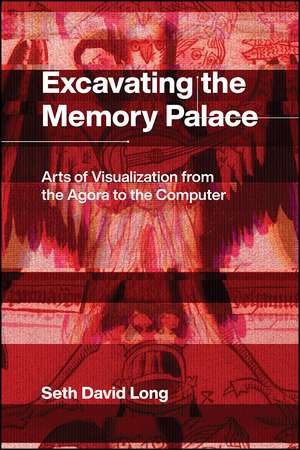Excavating the Memory Palace: Arts of Visualization from the Agora to the Computer
Autor Seth Longen Limba Engleză Paperback – 14 dec 2020
With the prevalence of smartphones, massive data storage, and search engines, we might think of today as the height of the information age. In reality, every era has faced its own challenges of storing, organizing, and accessing information. While they lacked digital devices, our ancestors, when faced with information overload, utilized some of the same techniques that underlie our modern interfaces: they visualized and spatialized data, tying it to the emotional and sensory spaces of memory, thereby turning their minds into a visual interface for accessing information.
In Excavating the Memory Palace, Seth David Long mines the history of Europe’s arts of memory to find the origins of today’s data visualizations, unearthing how ancient constructions of cognitive pathways paved the way for modern technological interfaces. Looking to techniques like the memory palace, he finds the ways that information has been tied to sensory and visual experience, turning raw data into lucid knowledge. From the icons of smart phone screens to massive network graphs, Long shows us the ancestry of the cyberscape and unveils the history of memory as a creative act.
In Excavating the Memory Palace, Seth David Long mines the history of Europe’s arts of memory to find the origins of today’s data visualizations, unearthing how ancient constructions of cognitive pathways paved the way for modern technological interfaces. Looking to techniques like the memory palace, he finds the ways that information has been tied to sensory and visual experience, turning raw data into lucid knowledge. From the icons of smart phone screens to massive network graphs, Long shows us the ancestry of the cyberscape and unveils the history of memory as a creative act.
| Toate formatele și edițiile | Preț | Express |
|---|---|---|
| Paperback (1) | 239.88 lei 6-8 săpt. | |
| University of Chicago Press – 14 dec 2020 | 239.88 lei 6-8 săpt. | |
| Hardback (1) | 673.14 lei 6-8 săpt. | |
| University of Chicago Press – 14 dec 2020 | 673.14 lei 6-8 săpt. |
Preț: 239.88 lei
Nou
Puncte Express: 360
Preț estimativ în valută:
45.90€ • 49.08$ • 38.27£
45.90€ • 49.08$ • 38.27£
Carte tipărită la comandă
Livrare economică 18 aprilie-02 mai
Preluare comenzi: 021 569.72.76
Specificații
ISBN-13: 9780226695280
ISBN-10: 022669528X
Pagini: 248
Ilustrații: 20 halftones, 12 line drawings
Dimensiuni: 152 x 229 x 18 mm
Greutate: 0.37 kg
Ediția:First Edition
Editura: University of Chicago Press
Colecția University of Chicago Press
ISBN-10: 022669528X
Pagini: 248
Ilustrații: 20 halftones, 12 line drawings
Dimensiuni: 152 x 229 x 18 mm
Greutate: 0.37 kg
Ediția:First Edition
Editura: University of Chicago Press
Colecția University of Chicago Press
Notă biografică
Seth David Long is assistant professor of English at the University of Nebraska.
Cuprins
Introduction: Memory vs. Mnemonic
Chapter 1. Arts of Memory in the Agora
Chapter 2. Arts of Memory in the Monastery
Chapter 3. The Memory Palace in Ruins
Chapter 4. The Memory Palace Modernized
Chapter 5. Theory and Practice of a Digital Ars Memoria
Chapter 6. The Social Memory Palace
Chapter 1. Arts of Memory in the Agora
Chapter 2. Arts of Memory in the Monastery
Chapter 3. The Memory Palace in Ruins
Chapter 4. The Memory Palace Modernized
Chapter 5. Theory and Practice of a Digital Ars Memoria
Chapter 6. The Social Memory Palace
Acknowledgments
Notes
Bibliography
Notes
Bibliography
Recenzii
"This project fills a gap in the current scholarship on the canon of memory, its fascinating inception and history, and implications for re-theorizing it within our contemporary technological context. Long's argument is historically deep and complex, building upon the iconic historical work of luminaries such as Carruthers, Yates, and others. He presents a theory that sees memory not as the isolated processes of brains in jars, but as the dynamic, social, outward-facing practice that has informed rhetorical output since antiquity, and continues to do so today. This is an insightful critique of today's data-driven practices of digital rhetoric, reminding the reader of the subjective, highly malleable set of choices that go into the selection, juxtaposition, combination, and scale of data manipulation."
“Long investigates the rhetorical canon of memory in a fascinating way that pushes the boundaries in both theory and method. He offers rich examples and anecdotes, ranging from ancient Greece and the Middle Ages to the present and breathes new life into how we conceive of memory, initiating a welcome empirical methodology for rhetorical theory that a range of researchers will find refreshing.”
“Just what happened to ars memoria? Long takes readers on an investigative journey of research and recovery, starting at the twilight of the Roman agora and ending with present-day digital networks. He tells the story of how the iconoclasts and their imageless memory systems changed the way rhetoricians recall the fourth canon and the significant social and historical implications for today’s digital world of visualized data. In an era of rapidly circulating news, Long’s book is a must read for humanists and pedagogues interested in questions about where, how, why, and what we remember.”
"Long’s book is a timely reminder that there are both great promises and great dangers lurking in new technologies, but that these cannot be appreciated without a historical sensibility. No matter how new-fangled technologies may seem, they will raise similar questions as in the past about what it is for us, as humans, to know."
